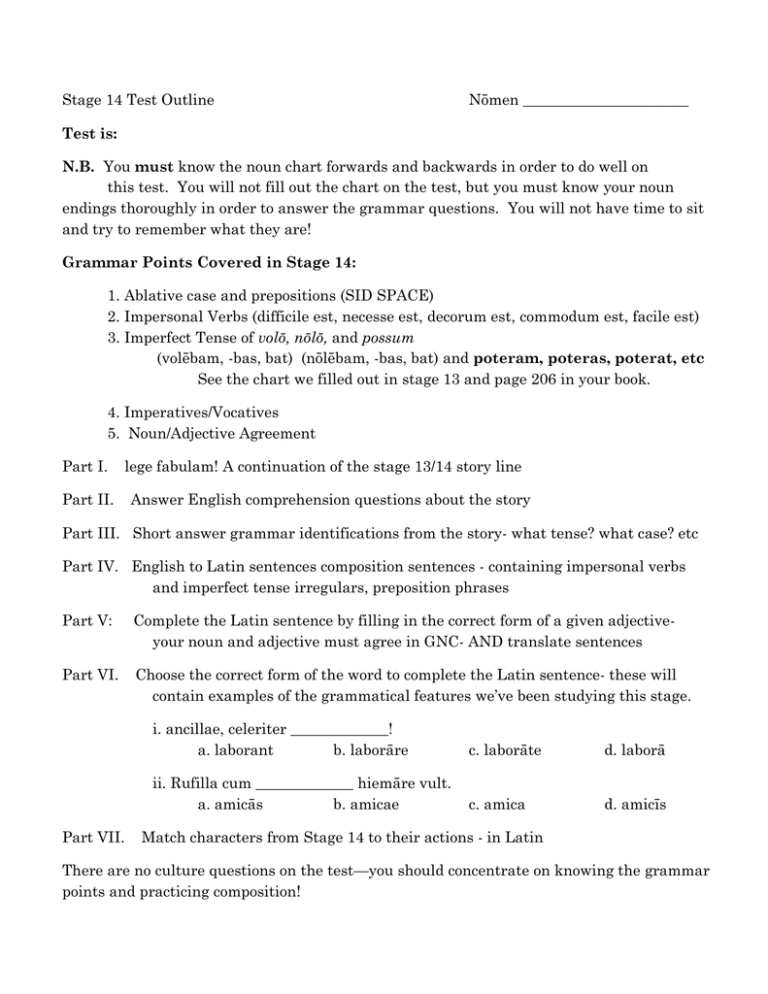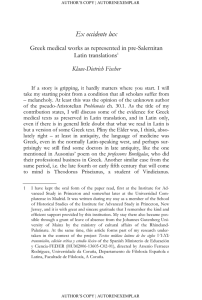Stage 14 Test Outline Nōmen ______________________
advertisement

Stage 14 Test Outline Nōmen ______________________ Test is: N.B. You must know the noun chart forwards and backwards in order to do well on this test. You will not fill out the chart on the test, but you must know your noun endings thoroughly in order to answer the grammar questions. You will not have time to sit and try to remember what they are! Grammar Points Covered in Stage 14: 1. Ablative case and prepositions (SID SPACE) 2. Impersonal Verbs (difficile est, necesse est, decorum est, commodum est, facile est) 3. Imperfect Tense of volō, nōlō, and possum (volēbam, -bas, bat) (nōlēbam, -bas, bat) and poteram, poteras, poterat, etc See the chart we filled out in stage 13 and page 206 in your book. 4. Imperatives/Vocatives 5. Noun/Adjective Agreement Part I. lege fabulam! A continuation of the stage 13/14 story line Part II. Answer English comprehension questions about the story Part III. Short answer grammar identifications from the story- what tense? what case? etc Part IV. English to Latin sentences composition sentences - containing impersonal verbs and imperfect tense irregulars, preposition phrases Part V: Complete the Latin sentence by filling in the correct form of a given adjectiveyour noun and adjective must agree in GNC- AND translate sentences Part VI. Choose the correct form of the word to complete the Latin sentence- these will contain examples of the grammatical features we’ve been studying this stage. Part VII. i. ancillae, celeriter _____________! a. laborant b. laborāre c. laborāte d. laborā ii. Rufilla cum _____________ hiemāre vult. a. amicās b. amicae c. amica d. amicīs Match characters from Stage 14 to their actions - in Latin There are no culture questions on the test—you should concentrate on knowing the grammar points and practicing composition! National Latin Exam Questions Relating to Stage 14 Grammar Topics Select the best answer! ____i. virī ex urbe ad _______ currēbant a. mōns b. montī c. monte d. montem ____ii. Curre, ________, ad silvam cum puerīs a. Marcus b. Marce c. Marcum d. Marcō ____iii. Omnēs civēs sine ______ ambulābant a. aquā b. aquae c. aquam d. aquās ____iv. Sextus clamāvit, “Curre ad casam celeriter!” a. Run b. I will run c. You are running d. To run ____v. Liberī in ______ cum familiā habitābant ____vi. Ianuae villārum nōn sunt _________ a. urbe b. urbis c. urbem d. urbe a. magnārum b. magnās c. magnīs d. magnae ____vii. Docete, magistra, puerōs de Africā a. I will teach the boys c. Teach the boys b. The boys are teaching d. To teach the boys ____viii. Iulius et Brutus erant a. amicōs bonōs b. amicus bonus c. amicōrum bonōrum d. amicī bonī ____ix. Cur, _______, iratus es? a. Luciō b. Lucī c. Luciōs d. Lucius ____x. Puerī fortēs in spēluncam currunt a. in the cave b. toward the cave c. into the cave d. from the cave ____xi. “Est puella pulchra et ________.” a. nobilī ____xii. b. nobilis c. nobilem d. nobilēs Pone, serve, cibum in mēnsam a. To place b. Place c. He will place d. He places ____xiii.Pater puellārum est _______ a. iratum b. irata c. iratus d. iratō ____xiv. ______ Appenninī sunt in Italiā a. Montēs b. Montium c. Montem d. Montibus ____xv. Da mihi meum librum! a. of me b. from me c. with me d. to me

